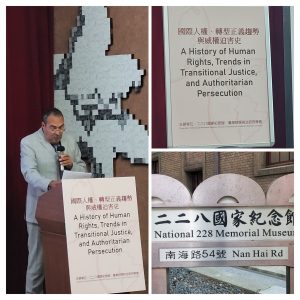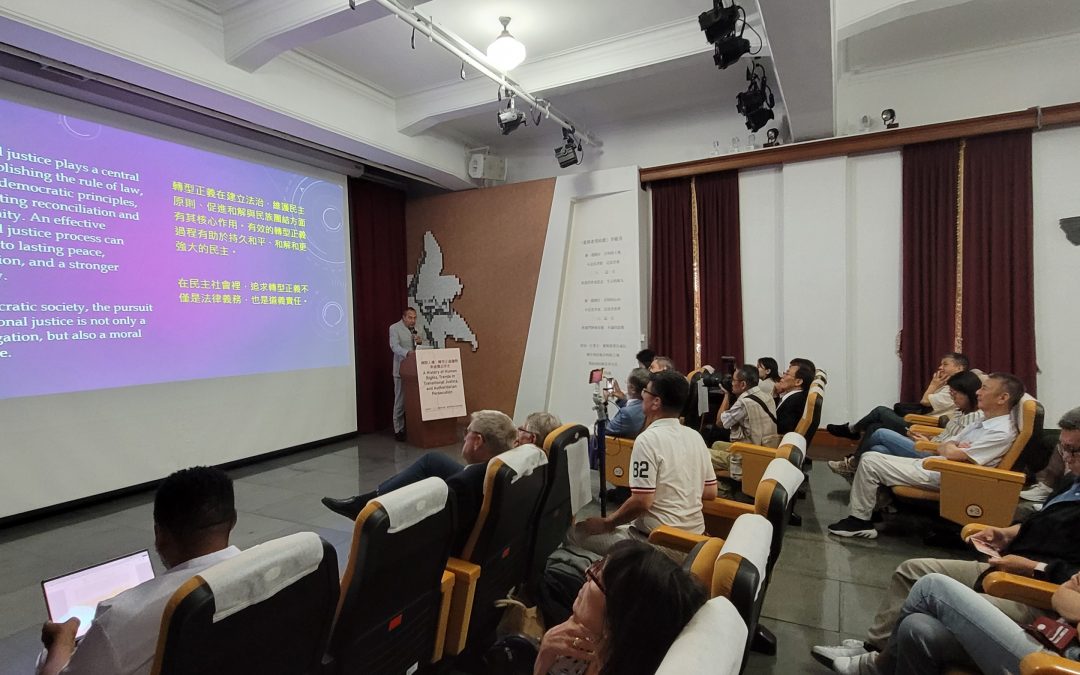Transitional Justice in a democratic country
Thierry Valle – 28/07/2023
 Transitional justice is a complex and essential process that a democratic country must undertake to address past human rights violations, atrocities, and injustices.
Transitional justice is a complex and essential process that a democratic country must undertake to address past human rights violations, atrocities, and injustices.
Today, we will examine the key components and strategies needed to ensure a successful transitional justice process in a democratic country like Taiwan.
We will see how the implementation of transitional justice in a democratic country can emphasize the importance of inclusiveness, accountability, restorative justice, and sustained engagement in achieving a just and harmonious society.
Transitional justice refers to the policies and processes that a country uses to deal with its past, particularly during transitions from conflict, authoritarian rule, or periods of oppression, or state institutions abuses.
Transitional justice plays a central role in establishing the rule of law, upholding democratic principles, and promoting reconciliation and national unity. An effective transitional justice process can contribute to lasting peace, reconciliation, and a stronger democracy.
In a democratic society, the pursuit of transitional justice is not only a legal obligation, but also a moral imperative.
First and foremost, for transitional justice to be effective in a democratic country, we must ensure that the process is inclusive and participatory. The voices of victims, survivors and affected communities must be heard and respected. Their experiences and perspectives are essential in shaping truth and accountability mechanisms.
It is also crucial to promote public dialogue and open discussions about the past. Civil society organizations, academia and the media have a responsibility to facilitate these conversations and promote empathy and understanding among citizens through open forums, truth commissions, conferences, etc., to provide a safe space for those affected to share their stories and seek recognition of the injustices they have suffered.
Impartial and independent judicial bodies should be established to investigate and prosecute perpetrators of human rights abuses to ensure that no one is above the law.
It should be noted that Taiwan is a world leader in this regard with its unique institution called the Control Yuan, whose function is to monitor and, if necessary, censure and impeach government officials.
There are three ways in which transitional justice is expected to influence democratic institution-building: delegitimizing past perpetrators and potential spoilers, implementing restorative justice, promoting reform, and empowering previously marginalized actors.
In 2009 Taiwan incorporated the ICCPR (International Covenant on Civil and Political Rights) and the ICESCR (International Covenant on Economic, Social and Cultural Rights) into its domestic law. Those two Covenants are considered higher than all other laws in Taiwan.
Both Covenants require that besides offering compensation and public apologizes to the victims, perpetrators of human rights violations should be brought to justice.
Taiwanese authorities must delegitimize and sanction prosecutor Hou Kuan-Jen and former finance minister Chang Sheng Ford for their abuses and violations of the laws against the Tai Ji Men.
In 2002 The Control Yuan found prosecutor Hou guilty of multiple violations of the law in the Tai Ji Men case and demanded to take disciplinary measures against him. But the case was dismissed under the protection of the Ministry of Justice and the Control Yuan failed to make him accountable for his abusive and false accusations against the Tai Ji Men. This year Mr. Hou may be promoted to the position of deputy director general of the Anti-Corruption Bureau.
In addition to legal measures, we must also emphasize the importance of restorative justice.
Beyond holding perpetrators accountable, the goal of transitional justice should be to repair the harm done to victims and communities. This could include reparations, compensation, and rehabilitation programs. Emphasizing restorative justice over retribution can promote healing and reconciliation, creating a more stable and cohesive society.
In Taiwan, emphasizing restorative justice by balancing accountability with restorative measures is essential to healing the wounds of the past, providing reparations, and rehabilitating the Tai Ji Men.
Restorative justice requires recognition of past actions and their consequences. The Tai Ji Men deserve to have their grievances acknowledged, and Taiwanese authorities should acknowledge the wrongs and abuses committed by Taiwanese government officials.
A formal apology from the Taiwanese government and relevant authorities can be a symbolic gesture of respect and recognition of the harm done.
The Taiwanese government should focus on providing reparations and redress to the Tai Ji Men, such as financial compensation, support for community projects, measures to rehabilitate the organization’s reputation, and providing them with land and funds to build a new academy to replace the Swiss Mountain Villa, which was destroyed as a result of the seizure of this Tai Ji Men property by Taiwan’s National Tax Bureau.
By highlighting the institutional failures that made human rights violations possible, it is argued that transitional justice can play an important role in triggering legislative, constitutional, and institutional reforms.
Transitional justice can also influence reform by creating a more human rights-sensitive or rule-of-law-oriented environment. While transitional justice may not directly trigger reform, the increased debates about accountability that it provokes and the increased scrutiny of human rights practices that it entails may increase government sensitivity to the issue.
In conclusion, transitional justice is not just an abstract concept, but a concrete step towards building a stronger, more resilient democratic country.
Ensuring transitional justice in a democratic country is a multifaceted and crucial endeavor. By adhering to key principles, implementing effective strategies, addressing challenges, and sustaining commitment, a democratic nation like Taiwan, by ensuring inclusivity, upholding the rule of law, prioritizing restorative justice, promoting education and awareness, and encouraging open dialogue can pave the way for reconciliation, healing, and a stronger democratic foundation.
The process may be challenging, but its successful completion can lead to a more just and harmonious society for present and future generations.
It is the duty and responsibility of the Taiwanese government to implement transitional justice for the Tai Ji Men, to protect its institutions and citizens from corruption, and to uphold its democratic values and vision of human rights.
More than anyone else, the Tai Ji Men deserve to have their honor restored, to have the injustices they suffered recognized as injustices and redressed, and to benefit from transitional justice in their long-running case.
And Taiwan, together with the Tai Ji Men, could work hand in hand to build a future in which the mistakes of the past serve as a reminder of the values the Taiwanese people hold dear and their commitment to justice, peace, and democracy.



